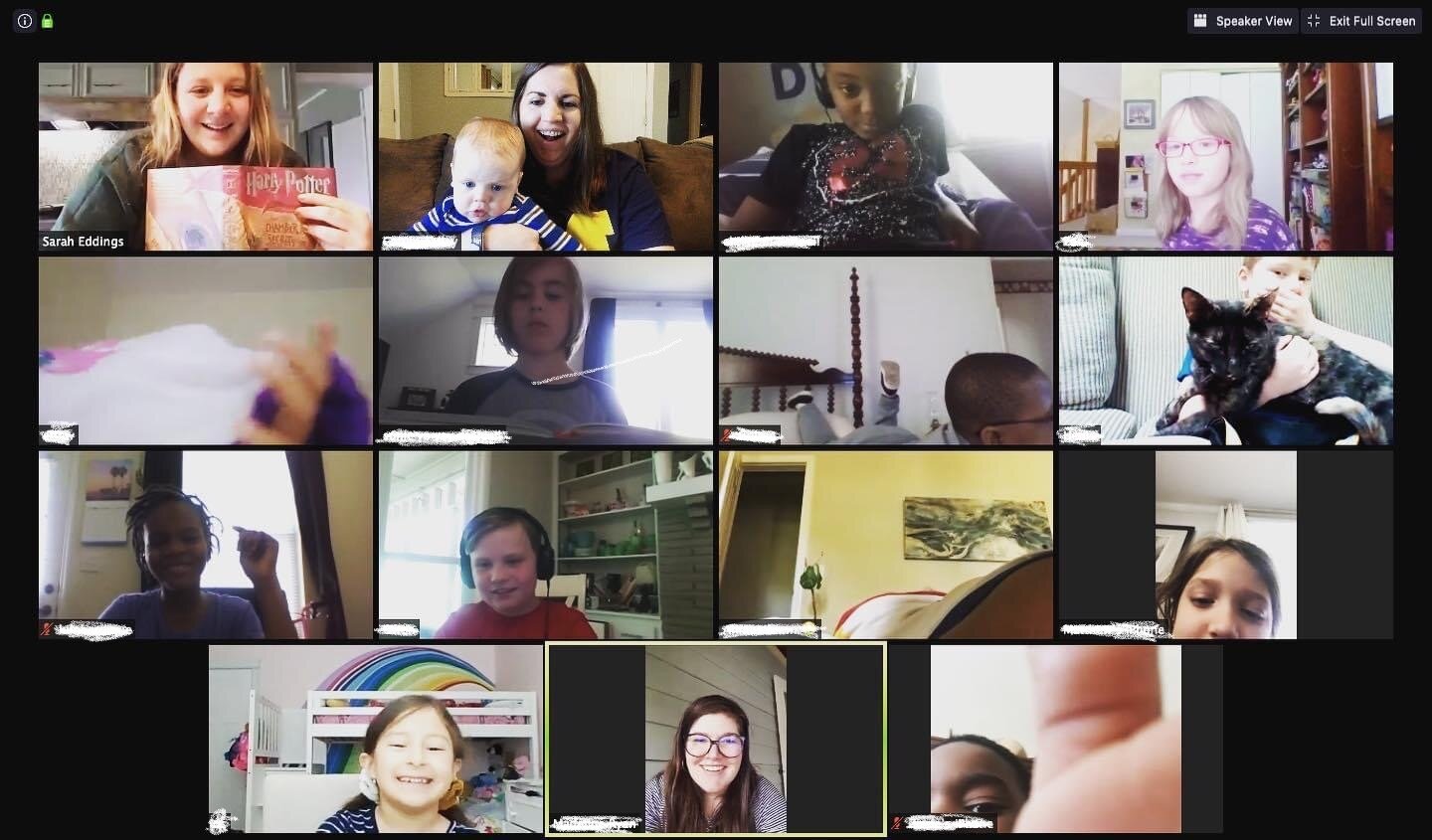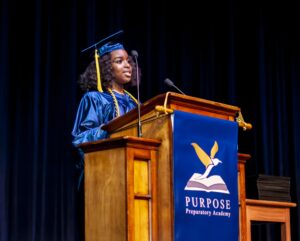By Sarah Eddings, second-grade teacher at Nashville Classical
Like all of my fellow teachers around the country, I never would have imagined that my last two months of teaching this school year would involve coaching 7-year-olds on the finer points of operating video conferencing software…but here we are. We’re two months into our distance learning program at my school, Nashville Classical, and while I’m far from being an expert, I have learned a few things about virtual learning.
Nashville Classical second-grade teacher Sarah Eddings reads aloud with her class from Harry Potter and the Chamber of Secrets during a regular Zoom meeting.
Communication with families is even more critical than before.
At Nashville Classical, we always view parents and families as valuable partners, but now more than ever, we are asking them to go above and beyond to ensure that their students are continuing to learn during the school closures. When distance learning first began after spring break, our school released four guiding principles that would remain consistent, regardless of how much distance learning may change. One of these guiding principles is “overcommunication.” To keep overcommunication attainable, each staff member was assigned to be the “case manager” of 5-7 families. As a case manager, that staff member would serve as a point of contact for families to answer any questions about technology, curriculum, or safety concerns that families may have for any scholar in their household. Early on, I felt strongly about remaining in contact with my entire class, so I requested to be the case manager for each of my students’ families. In the beginning, I spent a good majority of my day on the phone with every family to make sure they were safe and that they had all the materials, websites, and login information to set their student up for success. Now that we’re eight weeks in, most families have found their groove and have the logistics down, but I still call or text weekly, at a minimum, to check in and see how everything is going. I also send out weekly class emails to parents with any announcements I have for the upcoming week to make sure nobody misses anything. I’ve been so pleasantly surprised (although it shouldn’t come as a shock because I’ve always known we have amazing support from families) with how much our families have taken on during this time.
Kids still have differentiated needs.
Just like in a physical classroom, virtual classrooms are filled with students who have a wide range of academic and behavioral needs, so I’ve tried to extend my mindset of “meeting kids where they’re at” to distance learning. In addition to posting general curriculum for all students to access, I also have daily one-on-one interventions with students who need extra support with math and/or reading. Similarly, students who are English Language Learners receive additional support and I work closely with the adults who deliver their interventions to make sure nobody slips through the cracks. I also have times set aside for families who want some extra support with behavior as well. Sometimes that looks like spending extra time online with a student who “earned” more time to hang out with me from their parents. Other times it looks like me explaining assignment expectations and then checking their work for students who need to hear feedback from an adult who isn’t their parent. And other times it’s me reading a bedtime story to a child whose mom just got home from work and needs 15 minutes to herself. I don’t have kids of my own, so I basically allow parents to use me in whatever way makes their lives easier, because they are the ones who have the most difficult job right now.
It’s not just about academics.
Obviously, as a teacher, it’s my job to make sure my students make academic growth every year. But I know that in addition to a brain, each child also has a heart and a soul, and many of their hearts are hurting during this time of distance from friends. To make sure I continue to teach to the whole child, I’ve included social-emotional resources on my online classroom page and (upon parent request) I’ve directly sent resources for how to have discussions with their child about the global pandemic that’s currently happening. I strive to keep my students connected to each other and maintain a joyful classroom culture. I offer daily class meetings, where I spend 30 minutes reading to the class. We’ve almost completed Harry Potter and the Chamber of Secrets, and the class really enjoyed the days when we were fortunate enough to have guest readers who had much better British accents than mine. At the end of our time reading aloud, I give them extra time for “show and tell,” scavenger hunts, or the occasional talent show. I wanted to continue to incentivize learning like we do in the classroom, so students have been able to work for letters and prizes through the mail, a quick social distance visit with me in their yard, or to be the virtual Scholar of the Week who then gets to adopt one of the class’s pet stick horses forever. As an entire class, they’ve earned a Harry Potter themed virtual class party, as well as a virtual tour of the classroom that they miss so much.
I hope that in the future, when this generation of students has graduated and grown up, that they reflect on this unconventional school year and aren’t met with memories of loneliness or boredom, but instead with an immense feeling of gratitude for everybody who has made the past few months possible. For their families, who had to make countless sacrifices to become full-time caregivers while balancing work or unemployment stress; to technology companies who made resources free and accessible to all during this unprecedented time; to school leaders and curriculum developers who came up with creative solutions to nationwide problems overnight; and selfishly, to their teachers, who never hung up on them, even when the Wi-Fi connection was unstable.





